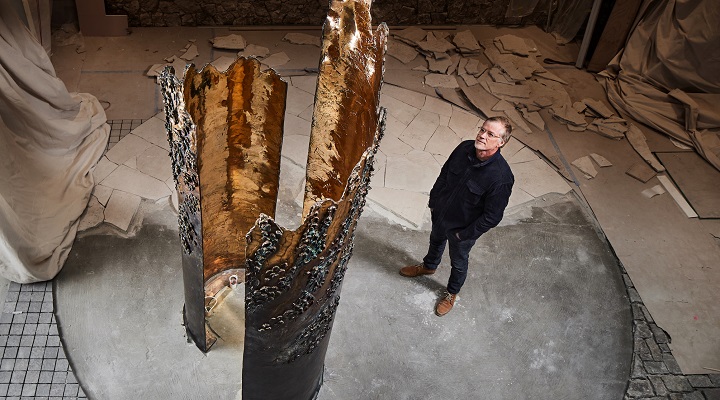Australian lifestyle and furniture brand Eco Outdoor has undergone a multi-million-dollar revitalisation program off the back of its accelerated growth over the last few years. The business – which specialises in architectural surfaces and outdoor furniture – launched a $4.5 million, multi-use showroom last week in its flagship Richmond store. Over the last few years, it has renovated its Sydney and Brisbane showrooms, relocated its Perth store and opened a shop in Auckland, New Zealand. The
d. The brand is also refurbishing its Los Angeles shop, and is set to expand to San Francisco next year.
According to founder and chief executive Ben Kerr, there are plans for the business to grow from $70 million to $150 million over the next three to five years.
“The new showroom [in Richmond] is an interface where clients who are homeowners, architects and builders can meet, explore ideas and be inspired by different types of services, textures, colours and patterns. It’s about solution selling and problem solving,” he told Inside Retail.
“We’ve also adopted a push-pull strategy in terms of our product offering. We respond to the market – what designers and architects who are working in the field tell us – while trying to push the market in new ways.
“For instance, we’re pushing a new glass-brick category, which is going to be transformational. It’s a different way of doing brick.”
He adds that there is a clear direction on the future plans of Eco Outdoor.
“We’re continuing to understand and evolve the business, and are currently in a scale-up phase,” he said.
Covid-19 overdrive, then slowdown
Eco Outdoor achieved 25 per cent growth during the pandemic as more customers worked from home, and sought to enhance their space from a lifestyle perspective.
Although Kerr feels there is some momentum in the marketplace, he anticipates challenges over the next few years, due to the slowdown of the construction sector, rising interest rates and falling property prices.
That’s part of the motivation behind the revitalisation strategy.
“We were very profitable pre-Covid-19. It went into overdrive [over the last few years] and now we’re getting back to a new normal, which is more sustainable, long term growth,” he said.
“We have to make sure our business is a well-oiled machine that continues to [improve] while being exposed to different geographical locations.”
Think globally, act locally
A key focus for Kerr is developing the organisation’s brand identity, while also finding its tribe and discovering where its customer base lives.
He explains that Eco Outdoor’s culture remains uniform and consistent globally, but it doesn’t take a cookie-cutter approach across the different stores.
“We’re very aware that you have to be culturally appropriate for the market you’re in. Even in Australia, Perth is very different to Sydney, Brisbane is different to Melbourne and so on. It’s not one-size fits all, and understanding those nuances is critical to our success,” he said.
“Our five key pillars – being people-led, customer-obsessed, design fanatical, simple and direct, and tell[ing] stories that inspire wonder – resonate, but they are expressed slightly differently.”
Kerr adds that the Los Angeles store has performed well, while also providing learning opportunities that the business has utilised moving forward.
“The first two to three years in particular, we were learning a lot. We [would] talk about being Australian, but we found that we had to drop that. In America, we are an American company with an Australian history,” he said.
“It’s the same in New Zealand and across Australia, you have to become embedded in the area you’re in and think like a local, but you can take that knowledge [and apply it elsewhere].”
South Africa, New Zealand or the South of France
Kerr is conscious of not wanting to stretch the business too thin, or trying to bite off too much, too quickly.
He said he is open minded in where or how the business grows, based on the opportunities that might arise.
“If the right person came along, or the right option, we might [move] quicker. We’re open to entrepreneurial perspectives when they come up,” he said.
“Would we go to South Africa? Maybe. I think we would resonate in Cape Town or Johannesburg.
“Would we open more stores in New Zealand? Probably [in an area like] Christchurch.
“Would we open in the South of France? Probably not.
“But you never know.”

